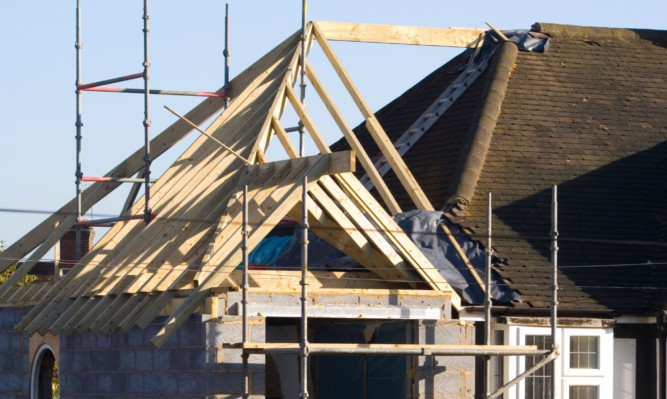
Plea to re-evaluate ‘outdated and unfair’ property valuation bands.
Thousands of families could face increases in council tax under controversial proposals to re-evaluate house bands.
Property prices are taxed on the basis of their worth almost 25 years ago. But since then there has been a home extensions boom, with as many as one in five owners choosing to improve their properties, increasing their market value.
Earlier this year the Scottish Government set up a commission to look at potential replacements for council tax. It is coming under pressure to recommend setting a modern value to every home so local authorities can recalculate the levy, which has not gone up since 2008.
While this would benefit people in properties that haven’t risen in value disproportionately, it would hike bills for those in homes that have.
The increases would be most painful in Edinburgh, Aberdeen and other towns where house prices have risen the fastest. But it would also severely impact homeowners who splashed out on expensive renovations.
Under current rules, home extensions, no matter how big, are not taken into account while a property stays in the ownership of the person who built them.
This means homes with added rooms or conservatories which can boost a house’s value by tens of thousands of pounds will only go up a council tax band if they’re sold on or if there is a national re-evaluation.
Opposition politicians and experts claim the system is unfair.
Emma Burnell, of local government thinktank NLGN, said: “Council tax does not fund local government services properly and it is becoming increasingly nonsensical.
“There are two obvious solutions. The first is to create more council tax bands so people in mansions pay their fair share. But the bigger change must be to revalue properties across England and Scotland so bills are based on up-to-date property values.
“The key point should be that a first revaluation is revenue neutral so the process is about a fairer division of the existing burden, and explicitly not raising new money.”
Stuart Adam, of the Institute for Fiscal Studies wants the Scottish and UK Governments to carry out frequent re-evaluations of council tax bands.
In 1991, the Government was required to assess the worth of the country’s 26 million domestic properties, placing each in one of eight council tax bandings. It followed John Major’s decision to ditch Margaret Thatcher’s failed poll tax.
Prices set then, in the depths of a recession that saw the property market collapse, were based largely on neighbourhood assessments, which put all same-sized properties in a street into one band. Since then, only Wales has had a council tax revaluation, meaning millions of homes across Scotland and England have remained in the same banding for 24 years. This is despite properties in some areas rising in value several times faster than others.
A 2010 study in England suggested 28% of homes would move up one band if new assessments were performed. And of the 1.3 million households in Wales reassessed in 2005, 33% went up one band or more, 58% stayed the same but only 8% went down.
Research has also shown almost 200,000 British households apply to make improvements such as conservatories, extensions and garage conversions every year, which would almost all lead to the property climbing the council tax band ladder.
For example, every additional room adds, on average, 5% to a property’s value. It’s 7.5% for conservatories, 11% for extensions and 12.5% for loft conversions.
Our reporters found examples of residential streets where households pay two bands higher than their neighbours, even though they live in smaller properties.
In South Queensferry, homeowner Kara Harrison spoke of her disbelief at paying almost £400 more a year than an adjacent house, despite having one bedroom less.
Her home a terraced three-bedroom house is in Band E, while a neighbour, who has added two bedrooms, a utility room and another bathroom to his semi-detached two-bedroom home, is in Band C.
She said: “It doesn’t seem right that I live in a house which is smaller than my neighbour, yet I pay a much higher council tax rate. Someone needs to look at this, because if houses were valued properly it could give councils much-needed income to pay for frontline services such as elderly care.”
Similar examples were found in town and cities such as Paisley, Livingston and Aberdeen.
Scottish Green MSP Alison Johnstone said these cases demonstrate it’s time for a new council tax system.
She said: “This is an unsurprising symptom of a tax that’s outdated and unfair.
“Greens want to see the council tax replaced with a system that can raise funds for vital public services in a fairer way, but also one that empowers councils to make their own choices about local needs.”
COSLA, which represents Scotland’s 32 councils, declined to comment.
But a spokesperson for the Scottish Government said ministers agree the council tax is unfair.
He said: “We set up the cross-party Commission on Local Tax Reform to examine fairer alternatives, which will deliver its independent report in the autumn.”
The SNP, Labour, Lib Dems and the Greens are all on the commission, but the Conservatives are boycotting it.
It is co-chaired by Local Government Minister Marco Biagi and the president of COSLA, Labour councillor David O’Neill.
Valuations are calculated by inspectors from the Valuation Office Agency, which is part of HM Revenue & Customs.

Enjoy the convenience of having The Sunday Post delivered as a digital ePaper straight to your smartphone, tablet or computer.
Subscribe for only £5.49 a month and enjoy all the benefits of the printed paper as a digital replica.
Subscribe